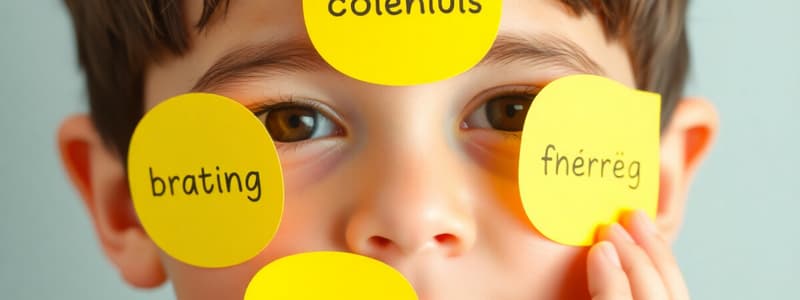Podcast
Questions and Answers
Which of the following demonstrates a common morphosyntactic error related to the plural 's' in children with SLI?
Which of the following demonstrates a common morphosyntactic error related to the plural 's' in children with SLI?
- I walked already.
- She have two book. (correct)
- Daddy fix cars.
- The dog is eating him food.
Identify the example that illustrates incorrect use of the past tense 'ed' in a child's speech.
Identify the example that illustrates incorrect use of the past tense 'ed' in a child's speech.
- I want a sticker.
- She is baking.
- I walk already. (correct)
- What we can make?
Which error demonstrates a misunderstanding of question formation in children with SLI?
Which error demonstrates a misunderstanding of question formation in children with SLI?
- This mine!
- Mommy put my book on the table.
- What do you think what is in here? (correct)
- He is going.
Which of the following is an example of incorrect pronoun usage associated with SLI?
Which of the following is an example of incorrect pronoun usage associated with SLI?
What error reflects a child's difficulty with using articles in speech?
What error reflects a child's difficulty with using articles in speech?
What is a common speech pattern exhibited by children with SLI when they struggle with vocabulary?
What is a common speech pattern exhibited by children with SLI when they struggle with vocabulary?
Which of the following is NOT a morphosyntactic feature that may be problematic for children with SLI?
Which of the following is NOT a morphosyntactic feature that may be problematic for children with SLI?
In the context of SLI, what types of errors in morphosyntax are often observed?
In the context of SLI, what types of errors in morphosyntax are often observed?
What factors can influence the inconsistency of morphosyntactic errors in children with SLI?
What factors can influence the inconsistency of morphosyntactic errors in children with SLI?
Which aspect of discourse involves the ability to tell stories?
Which aspect of discourse involves the ability to tell stories?
Flashcards
SLI Vocabulary Deficits
SLI Vocabulary Deficits
Children with SLI often have trouble with vocabulary, sometimes leading to roundabout or clumsy ways of talking (circumlocution).
Circumlocution
Circumlocution
A roundabout or clumsy way of talking, often used by children with SLI when trying to name things.
SLI Morphosyntactic Deficits
SLI Morphosyntactic Deficits
Problems with grammar (putting words together and sentences together) are key challenges in SLI, affecting how children construct sentences.
Morphosyntactic Feature Difficulties (SLI)
Morphosyntactic Feature Difficulties (SLI)
Signup and view all the flashcards
SLI Discourse Deficits
SLI Discourse Deficits
Signup and view all the flashcards
Morphosyntactic deficits in SLI
Morphosyntactic deficits in SLI
Signup and view all the flashcards
Present Progressive verb -ing
Present Progressive verb -ing
Signup and view all the flashcards
Plural -s
Plural -s
Signup and view all the flashcards
Past Tense -ed
Past Tense -ed
Signup and view all the flashcards
Wh-questions (e.g., Who, What, Where)
Wh-questions (e.g., Who, What, Where)
Signup and view all the flashcards
Study Notes
Specific Language Impairment (SLI)
- Children with SLI exhibit vocabulary deficits, sometimes leading to circumlocution (talking around the point).
- Examples of circumlocution include describing an English muffin as "something round and English", a zipper as "on my brother's pants", and a spoon as "you eat breakfast with it".
Morphosyntactic Deficits in SLI
- Key deficits in SLI are in morphology (combining words) and syntax (combining sentences).
- Morphosyntactic development is delayed in SLI children, although they follow a similar developmental sequence as typically developing (TD) children.
- Some morphosyntactic structures are particularly challenging for children with SLI.
Types of Errors in SLI
- Errors in SLI can be omissions (like leaving out '-ed' endings) or substitutions (like replacing 'me' with 'I').
- Error patterns are not always consistent and are influenced by factors like sentence/word complexity, sound production, and familiarity with the words.
Discourse Deficits in SLI
- Discourse, including narrative and conversational skills, are impacted in SLI.
- Successful discourse involves the ability to tell stories and negotiate conversations.
Table 6.2: Common Morphosyntactic Deficits in English-Speaking Children with SLI
- This table lists common morphosyntactic features challenging for children with SLI.
- Errors are exemplified by phrases like "Dog eat him food" (instead of "The dog is eating his food") and other examples showcasing missing or substituted grammatical elements, like plural "s", past tense "-ed", prepositions, pronouns, auxiliary verbs, articles, and possessive ’s.
Studying That Suits You
Use AI to generate personalized quizzes and flashcards to suit your learning preferences.
Description
This quiz explores Specific Language Impairment (SLI), focusing on vocabulary deficits, morphosyntactic challenges, and common error patterns observed in children with SLI. Understanding these aspects can enhance awareness of language development issues and strategies to support affected children.




